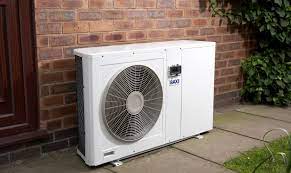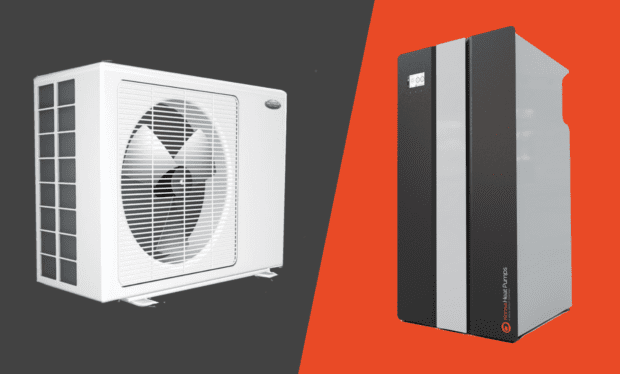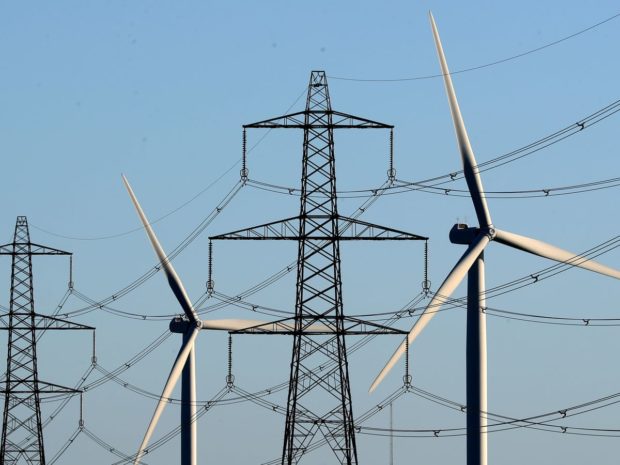Ground source review: Llwyn Eirin
Kensa’s award-winning Shoebox ground source heat pumps are being installed in a landmark development of energy-efficient new build housing in North Wales.


Some European manufacturers are developing high-temperature heat pumps which they suggest could ease the UK’s transition from fossil fuels to electric heating. But Kensa, the UK’s leading manufacturer of ground source heat pumps, cautions that the lower efficiency of higher temperature heat pumps would mean higher running costs for the consumer, wiping out any potential savings made by retaining existing radiators and insulation.
James Standley, Managing Director of Kensa Heat Pumps explains why overcoming one problem at the expense of the consumers’ electricity bill and the environment doesn’t seem like the right solution, and why properly networked ambient temperature ground source heat pumps would make a more affordable and effective option in the long term.
Higher temperatures but lower efficiencies


Traditionally, to get the most efficient operation from a heat pump, it’s important that the outlet temperature of the heating distribution system is kept as low as possible. That way, the heat pump has to perform less work to upgrade the energy from the source to a comfortable temperature inside the property.
Achieving a higher outlet temperature means compromising on efficiency which will result in higher heating bills for consumers and a higher carbon footprint when compared to ambient temperature ground source heat pumps, which typically produce 3-4kW of heat for every 1kW of power used. Ground source heat pumps have the added advantage of a stable source temperature all year round, whereas air temperatures fluctuate day and night and through the seasons, which contributes to efficiency losses.


High-temperature air source heat pumps with increased electrical consumption would put more strain on the electricity grid than more efficient ground source options. Widespread adoption of high-temperature air source heat pumps in the UK would require more new power stations to be built at a cost of millions of pounds than would be the case with other heat pump options. This would put further pressure on wholesale electricity prices in addition to the impact on carbon emissions.”
No such thing as a ‘straightforward switch’


One of the claims being made by manufacturers is that if a homeowner switches from a boiler to a high-temperature heat pump, they will save money because they don’t have to replace their radiators. However, the reality might not be as straightforward as that.
It may not be the case that existing radiators are compatible with new high-temperature heat pumps, so would need to be replaced anyway. The CO2 refrigerant used with high-temperature air source heat pumps means a large buffer tank is required for the system to operate. Locating this within an existing home could be an issue and would lead to significant plumbing alterations.
Ambient temperature heat networks are the future


One option is to take responsibility away from individuals to change their boilers and instead introduce a large-scale network of ground source heat pumps similar to the design and infrastructure of the current gas grid. The movement of heat at an ambient, temperature is central to achieving this, as the lower the temperature of heat distributed through a heat network, the higher the system’s efficiency.
Kensa is currently undertaking demonstrator community heating projects and UK Government has recently allocated £19m of new funding towards heat network innovations which many believe represent the lowest cost pathway to heat decarbonization.
Against a turbulent backdrop of unprecedented energy price rises that will affect all members of society, ground source heat pumps offer stability by remaining the lowest cost (and lowest carbon) electric heating option.
The energy regulator Ofgem announced the new energy price cap for April – the maximum amount that suppliers in Great Britain can charge domestic customers on standard tariffs. Rates have risen steeply because global wholesale prices have increased exponentially.
Many existing Kensa customers may understandably be concerned about what these energy price hikes will mean for them, and people currently considering ground source technology in their properties will want to know how these changes may affect their decision.
This blog will answer those questions and provide some reassurance.
Why have energy prices risen so much?


Reasons for this include a cold winter in Europe in 2020/21 which put pressure on supplies, as well as a number of technical and geopolitical issues that are beyond suppliers’ control. This impacts owners of electrically-powered heating devices, such as heat pumps, because a third of the UK’s electricity is currently generated by gas.
The high price of electricity is also caused, partly, by the policy of previous governments who loaded electricity prices to pay for subsidies for renewable technologies.
So, what does this mean for existing customers and are ground source heat pumps still a smart investment against rising energy prices?
How GSHPs insulate against turbulent energy prices
The silver lining is, that by their very nature, ground source heat pumps can reduce your vulnerability to fluctuating energy prices. Ground source heat pumps deliver 3 to 4kW of renewable energy for every 1kW of electrical power consumed. The rest of the energy needed is harnessed for free from ground (or water) sources around your property and replenished by sunlight and rainfall – effectively creating your very own natural energy battery.
This makes ground source heat pumps the most energy-efficient heating technology available, reducing a property’s heating costs by around two-thirds compared to direct electric heaters, for example. So, a smaller proportion of the power needed to run the heat pump is going to be affected by rising energy costs. And a system that produces much more energy than it consumes will deliver lower running costs for your household.
With an ErP rating of A+++, the Evo is Kensa’s most efficient heat pump. It is integrated with the ground-breaking Genesis System Manager, the world’s first ground source controller, that monitors and records efficiencies to help the Evo perform at its best.
Another benefit is that as a non-combustion heating system, there is no annual servicing requirement for a ground source heat pump, saving you money compared to a gas boiler. There are, of course, simple system checks that can be performed by an installer which will help get your system ready for the heating season and make sure your heat pump is performing at its best.
GSHPs vs other electric heating


Out of all forms of electric heating, ground source heat pumps bring the double benefits of highest efficiencies and lowest carbon footprint.
We have already mentioned how they outstrip direct electric storage heaters for running cost savings by two thirds. But, if you have already installed, or are considering installing a ground source heat pump rather than an air source variant, you are making a smart investment.
The distinction between an air source and a ground source heat pump is important. Air temperatures can be unstable and fluctuate, particularly in the winter and after dark. The ground holds a stable temperature of 8 to 12°C all year round, which means the average ground temperature in winter will always be significantly warmer than the average air temperature.
Due to the unstable source temperature and lower efficiencies of air source heat pumps, customers will need to pay for more electricity to bring colder air up to temperature at the times when heating is typically needed the most, costing end-users more in the long term.
Because of their efficiency deficit, any heat pump rollout programme featuring large numbers of air source heat pumps will require far more back-up generating and storage capacity than ground source. Hypothetically, if all homes across the UK were installed with air source heat pumps – on the coldest day of the year – the air source units would require additional power grid capacity equivalent to 2,400 x 10MW wind turbines or 8 x 3GW nuclear power stations versus the same homes heated with ground source heat pumps¹. And these back up power sources will likely have to be subsidised with taxpayers’ money.
How can ground source heat pumps save me money?
In addition to lower running costs, ground source heat pumps bring other advantages that increase their affordability in comparison with other technologies. Ground source heat pumps can be installed into any building – new or existing properties – and one of the unique benefits is minimal maintenance requirements and long-life expectancy. This means it costs less to own a ground source heat pump than any other type of heating technology.
As a non-combustion heating system, there is no annual servicing requirement for a ground source heat pump. It requires very little maintenance, and the unit is installed safely inside the home, away from damaging external elements.
There is more good news; most heat pump system installations are made in tandem with energy efficiency measures which mean making changes to the building itself. This usually starts with insulation for the simple reason that heat is better contained inside an insulated building because its demand for energy is reduced. If you have or are planning to, take measures to better insulate your home, then your heating system will perform better and help lower your running costs.
The lowest carbon footprint


Because they don’t burn anything, they produce no air pollution – particulates, Nitrogen Oxide (NOx) or Sulphur Oxide (SOx). Poor air quality can be a huge risk to public health. A 2020 study suggests 17,000 premature deaths could be prevented each year by reducing mortality and diseases linked to poor air quality.
There are some NOx emissions associated at the point of electricity generation for the grid, and therefore the small amount of electricity that is ultimately used to power the heat pump. However, the electricity consumed by a heat pump typically comes from power stations located outside of cities, in areas where air pollution is greatly reduced and it is simpler to monitor, measure and control local pollution effects.
As previously mentioned, ground source heat pumps use a small proportion of electricity compared to their output. As more renewables such as solar and wind supply the grid with power, there is potential to decarbonise the small portion of the electricity they consume. This means the same low cost, highly efficient ground source heat pump in your home today could be even better for the environment and our air quality in ten years’ time. And that’s a smart investment.
Kensa steps up production to lead the nation’s clean-heating revolution
UK Declaration of Conformity Commercial range
EU Declaration of Conformity Commercial range
UK Declaration of Conformity EVO
EU Declaration of Conformity EVO
UK Declaration of Conformity Shoebox
EU Declaration of Conformity Shoebox
UK Declaration of Conformity Shoebox NX
But flexibility of the renewable heat solution is key, not just efficiency, says Kensa Heat Pumps
‘Businesses like Kensa will play a big part in developing the heat pump manufacturing industry in the UK’ says Energy and Climate Change Minister Lord Callanan after taking company’s virtual street tour
An ‘Everyday Climate Hero’ from Kensa Heat Pumps in Cornwall will see her portrait taken by world-renowned photographer Rankin plastered on billboards around the UK.
Welcome to Green Street – A Mobile AR Experience
Presenting Kensa’s vision for zero-carbon urban energy.
This mobile AR experience allows you to see the greening of Green Street, a real-life urban community in Glasgow, and how any street can be a Green Street.
Walk through its zero-carbon transformation from the comfort of your home, and uncover how the ground beneath your feet can transform how we heat and power our homes and combat climate change.
Experience Green Street Now:
https://ar.greeninggreenstreet.com/
The Kensa Group have been awarded a global climate prize
Kensa’s innovative ground source heat pumps and shared ground loop arrays deliver efficient and affordable heating, tackling a major source of carbon emissions and reducing fuel poverty. Tenants in social housing have seen their heating costs halved – while Kensa is also investing in developing skills and training, and engaging in political lobbying to increase the uptake of this game-changing, low-carbon heating technology.














